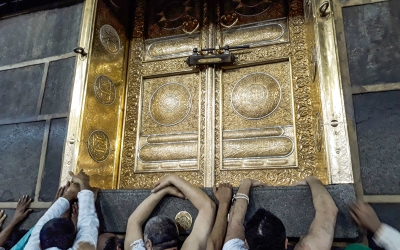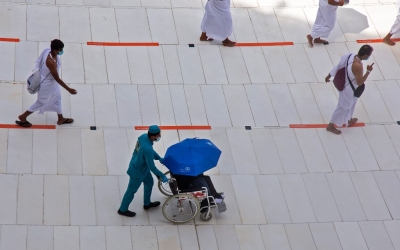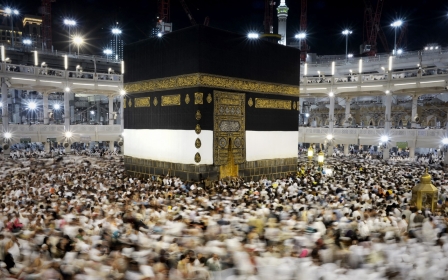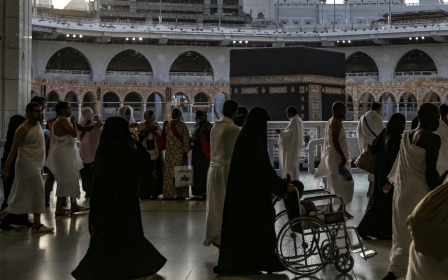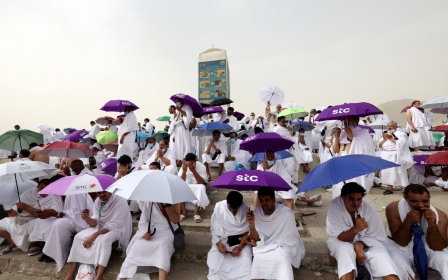Hajj 'lottery' explained: The random draw for western pilgrims
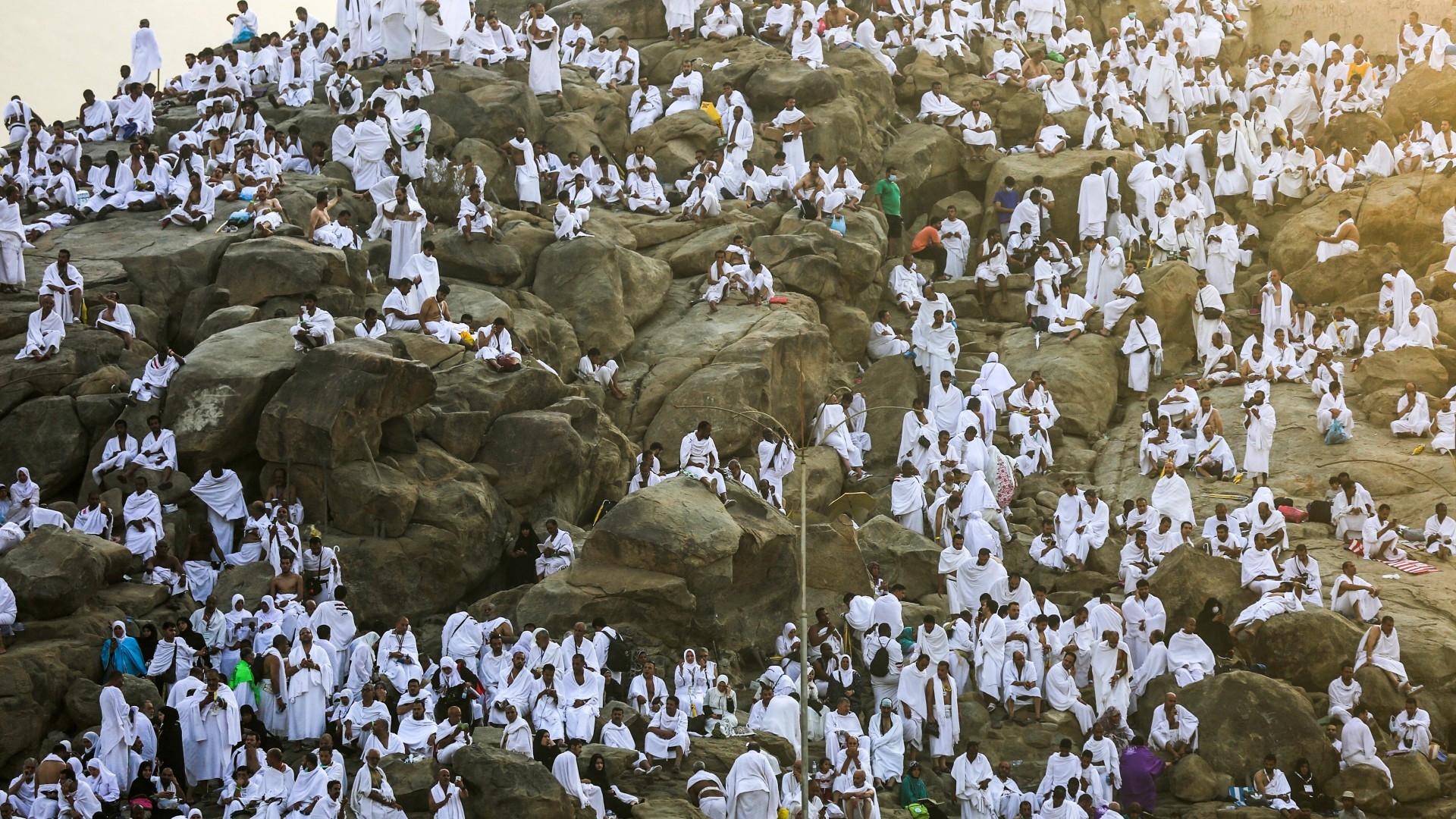
The Hajj "lottery" for western pilgrims closed on Monday, with prospective pilgrims finding out the status of their application over the next two days.
Last week, Saudi Arabia's Hajj ministry announced that Muslims from Europe, Australia and the Americas would need to apply to attend Hajj, which is taking place between 7-12 July this year, through a random draw on the government-backed Motawif website.
The Hajj pilgrimage is one of the largest religious gatherings in the world and is considered a religious obligation to be completed during the lifetime of every Muslim who is healthy and able to afford it.
For this year's pilgrimage, one million worshippers will participate after it had been scaled down because of the Covid-19 pandemic the previous two years. In 2019, around 2.5 million pilgrims participated.
The decision to change the process of travelling to Hajj for western Muslims has confused worshippers and travel agents alike, particularly given that the pilgrimage begins in less than one month.
New MEE newsletter: Jerusalem Dispatch
Sign up to get the latest insights and analysis on Israel-Palestine, alongside Turkey Unpacked and other MEE newsletters
The random lottery launched on Friday, and crashed briefly due to high demand.
Here’s everything you need to know about the new ballot system.
Who can apply?
The random draw is applicable to all countries in North America, South America, non-Muslim majority countries in Europe, Australia and New Zealand.
All applicants must be under the age of 65, and must have completed two doses of the Covid-19 vaccination. Those attending must submit a negative PCR test within 72 hours of departing to Saudi Arabia.
Only those who haven’t performed Hajj within the last five years are eligible to enrol.
The draw is the only way that Muslims from western countries can participate in this year’s Hajj. Anyone who has prepaid to do the pilgrimage with a tour operator has been urged to request a refund.
Cost and packages
There are three types of packages that western pilgrims can apply for: silver, gold and platinum.
The silver package starts at $5,986, and includes flights, a five-star hotel close to the Grand Mosque in Mecca, transportation buses, catering services and camp locations at pilgrimage sites Mina, Arafat and Muzdalifah.
This package covers a total of 12 days. Notably, it does not appear to include a trip to the holy city of Medina - not officially part of the Hajj, but a city most pilgrims traditionally visit either before or after the pilgrimage
The gold package starts at $6,296, with “high quality services from the beginning till the end of your journey”.
This package includes all the same services as silver, with the addition of a stay in Medina in a five-star hotel. The transportation bus is described as “VIP”, and the package covers a period of 21 days in total.
The platinum package begins at $9,768, and is described on the website as a “luxurious service”. Like gold, it includes five-star stays in Makkah and Medina, and “VIP transportation buses”.
The key difference is it consists of “superior camping spots equipped with excellent facilities and modern furniture”, and the exclusive use of the Al-Mashaaer metro line to move between holy sites.
A note on the Motawif website prompts users that the information provided is only a “preview of the actual packages” and the services can only be selected in full after an applicant has been successfully chosen.
Timeframe
The Hajj lottery opened on 10 June, and is due to close on Monday, with applicants expected to have uploaded all their passport and vaccination documentation by then.
An official draw will be carried out from 15 to 18 June, with eligible candidates randomly selected.
Those who are successful will then be notified and will be expected to complete payment through Motawif’s online portal. Once payment is accepted, e-visas will be issued, starting from 17 June.
According to Motawif, the first arrival of pilgrims from western countries is scheduled for 26 June.
This means some pilgrims will have just 11 days between finding out if their application was successful, and making their journey to Jeddah airport.
Pilgrims typically take months to prepare for the religious rites associated with the Hajj, attending seminars to ensure the pilgrimage is completed correctly. Under the new system, western pilgrims will have a matter of just days.
What about other countries?
According to the Hajj ministry, foreign pilgrims will make up 85 percent of the one million participants.
As with all years, the quota will be split based on the number of Muslims in each country.
Indonesia received the highest share with a quota of 100,051, while Pakistan came second with 81,132 and India third with 79,237.
Like western pilgrims, domestic Saudi participants were also subject to a random draw organised by the kingdom. Over 390,000 applications were received, with priority given to those who have not completed Hajj before. Successful applicants were notified by text message on Sunday, and now have two days to complete their payments.
In other Muslim majority countries around the world, the system of selection varies.
In Pakistan for example, 60 percent of places are granted based on private tour operators, while 40 percent of places are organised by a Pakistani government scheme that involves a computerised ballot.
In Turkey, the 37,770 people attending this year were chosen via an application system which prioritised those who have never been. Many Turks have been applying for several years, if not decades, waiting for their names to be chosen.
Middle East Eye delivers independent and unrivalled coverage and analysis of the Middle East, North Africa and beyond. To learn more about republishing this content and the associated fees, please fill out this form. More about MEE can be found here.


